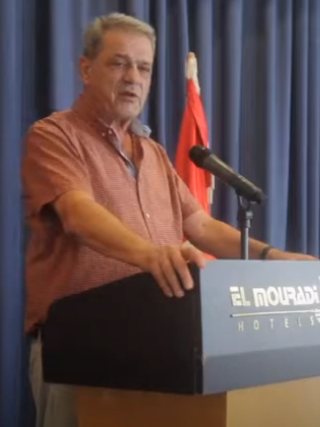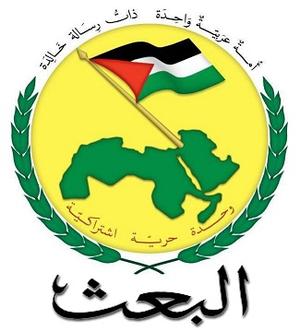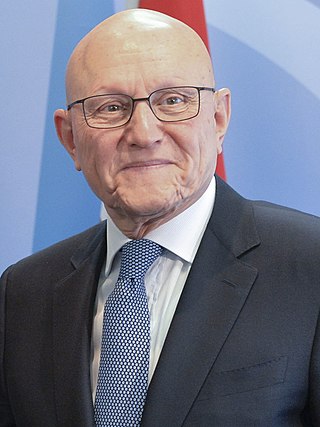Related Research Articles

The Kataeb Party, officially the Kataeb Party – Lebanese Social Democratic Party, also known as the Phalangist Party, is a right-wing Christian political party in Lebanon founded by Pierre Gemayel in 1936. The party and its paramilitary wings played a major role in the Lebanese Civil War (1975–1990), opposing Palestinian insurgency in South Lebanon as well as collaborating with Israel. During the 1982 war, Phalangist militiamen committed the infamous Sabra and Shatilla massacre with support from the IDF. The Phalangists were also responsible for the Black Saturday massacre, the Tel al-Zaatar massacre, Ehden massacre, and the Karantina massacre, some of the worst massacres committed during the Lebanese Civil War. In 1982, Pierre's youngest son Bachir, the leader of the party's militia, was elected President, but was assassinated before he could take office. He was succeeded by his older brother Amine, who led the party through much of the war. In decline in the late 1980s and 1990s, the party slowly re-emerged in the early 2000s and is currently part of the Lebanese opposition. The party currently holds 4 out of the 128 seats in the Lebanese Parliament.

Nabih Mustafa Berri is a Lebanese politician who has been serving as Speaker of the Parliament of Lebanon since 1992. He heads the Amal Movement and its parliamentary wing, Development and Liberation Bloc.

Al-Ahbash, also known as the Association of Islamic Charitable Projects is a Sufi religious movement and, in Lebanon, political party, which was founded in the mid-1980s. The group follow the teachings of Ethiopian scholar Abdullah al-Harari. Due to the group's origins and activity in Lebanon, the Ahbash have been described as the "activist expression of Lebanese Sufism."

The Democratic Left Movement is a nonsectarian and a democratic leftist political party. It was founded in September 2004 by left-wing and center-left intellectuals and activists some of whom had previously split from the Lebanese Communist Party (LCP) while some were student activists from the "Independent Leftist Groups". The DLM affirms a European-style social democracy—but is open to all forms of leftism and encourages the development of a true secular state. The party operates under a decentralized framework that emphasizes diversity of thought for a progressive society in a liberal democratic environment. It participated in the 2005 Cedar Revolution, a wave of demonstrations against the Syrian occupation of Lebanon, and calls for correcting imbalanced relations with Syria.
Michel Murr was a Lebanese politician and businessman. He served as member of parliament, deputy prime minister and interior minister and was a prominent lawmaker in the northern Metn region.

Najah Wakim is a Lebanese politician who served as member of parliament from 1972 to 2000. He is the president of the People's Movement.

Abdul Rahim Mrad is a Lebanese politician. He was born in 1942. A former minister, he is the founder of the Lebanese International University. He is the leader of the Union Party.

Kamel Bey El-Assaad was a Lebanese politician and za'im . Grandsons from Ghada al Kharsa: Ahmad El-Assaad had two children: Kamel El-Assaad, and Layan El-Assaad Maha did not have any children. Iman had three children. Ashraf Khalil, Ayman Khalil, and Kamil Khalil

Walid Khalidi is a Palestinian historian who has written extensively on the Palestinian exodus. He is a co-founder of the Institute for Palestine Studies, established in Beirut in December 1963 as an independent research and publishing center focusing on the Palestine problem and the Arab–Israeli conflict, and was its general secretary until 2016.
Nawaf Abdallah Salim Salam is a Lebanese politician, diplomat, jurist and academic who is the prime minister-designate of Lebanon.

The Arab Socialist Ba'ath Party – Lebanon Region, commonly known as the Arab Socialist Ba'ath Party in Lebanon and officially the Lebanon Regional Branch, is a political party in Lebanon. It is the regional branch of the Ba'ath Party. The leadership has been disputed since 2015; however, Fayez Shukr was the party leader from 2006 to 2015, when he succeeded Sayf al-Din Ghazi, who succeeded Assem Qanso.

Samir Frangieh was a Lebanese politician, member of the Lebanese Parliament and a leftist intellectual. He was from the Frangieh family, one of the well-known political families of Lebanon.

Tammam Saeb Salam is a Lebanese politician who was the Prime Minister of Lebanon from February 2014 until December 2016. He also served as the acting President of Lebanon from May 2014 until October 2016 in his capacity as prime minister. He previously served in the government of Lebanon as minister of culture from 2008 to 2009.

Beirut II was a parliamentary constituency in Lebanon. It covered three neighbourhoods (quartiers) of the capital; Dar El Mreisse, Zuqaq al-Blat and Bachoura. Michael Hudson described Beirut II as a 'small "catch-all" district'. This constituency was used in the 1960, 1964, 1968 and 1972 elections.

In Lebanese politics, Minorities is a term that includes six different Christian sects; Syriac Orthodox, Syriac Catholics, Assyrian Church of the East, Chaldean Catholics, Latin Catholics and Coptic Orthodox. 1 of the 128 seats in the national parliament is allocated to Minorities. The Minorities' seat is elected from Beirut III electoral district, an electoral district with a large Sunni Muslim majority.

Bint Jbeil electoral district was an electoral district in Lebanon. It covered all areas of the Bint Jbeil District. The constituency elected three Shia Muslim members of the Parliament of Lebanon.
The Bourj Hammoud electoral district or the Eight Constituency was an electoral district in Lebanon, used in the 1953 parliamentary election. The district elected a single Armenian Orthodox parliamentarian.

Beirut I is an electoral district in Lebanon. The district elects eight members of the Lebanese National Assembly – three Armenian Orthodox, one Armenian Catholic, one Greek Catholic, one Greek Orthodox, one Maronite and one Minorities.

Faisal Daoud is a Lebanese politician. He was born in 1954. Daoud served as general secretary of the Lebanese Arab Struggle Movement between 1986 and 2014.
Zaki Mazboudi was a Lebanese politician, lawyer and economist. He served as government minister twice and represented the third constituency of Beirut in the Parliament of Lebanon 1972–1992.
References
- 1 2 3 The Beirut Review: A Journal on Lebanon and the Middle East (3-4 ed.). Lebanese Center for Policy Studies. 1992. p. 152.
- 1 2 3 4 Publitec Publications (2005). Who's who in Lebanon. Éditions Publictec. p. 46.
- ↑ The Middle East, Abstracts and Index. Vol. 16. Northumberland Press. 1994. p. 90.
- ↑ The Lebanon Report (1-2 ed.). Lebanese Center for Policy Studies. 1996. p. 37.